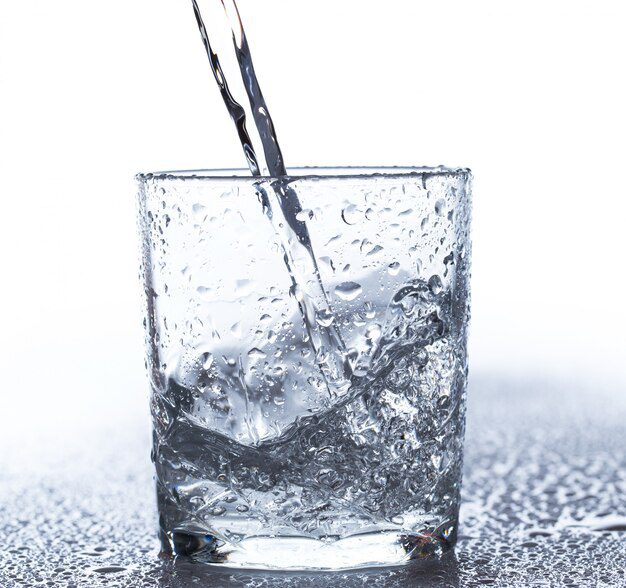⚠️ Medical Disclaimer
Important: This content is for informational and educational purposes only. It should not be used as a substitute for professional medical advice, diagnosis, or treatment. Always consult with a qualified healthcare provider before making changes to your diet, taking supplements, or if you have questions about a medical condition. Never disregard professional medical advice or delay seeking it because of information you read here.
Last Updated on February 24, 2024 by Grace Oluchi
The importance of water cannot be overemphasized. An average adult should drink 250 ml to 500 ml in the morning, and this should be a healthy habit. Drinking water is one of the most essential acts of life. In fact, I dare to say it is the best liquid out there. It contains zero fat nor calories, cleanses our bodies, transports nutrients to cells, and regulates the body temperature.
There are more health benefits concerning water, and you will find out more in this article.
How many times do you drink water a day? If the least is less than 5 times then there’s a problem. It’s important to drink at least 7 to 10 glasses a day. It’s great to drink it before and after eating, especially before eating. However, some people do drink water in between their meals and that’s fine. If you don’t start drinking more of it, you could be putting your life in danger. Your body needs it, every part of your body needs it, so don’t starve your body of it.
9 Health Benefits Of Drinking Water
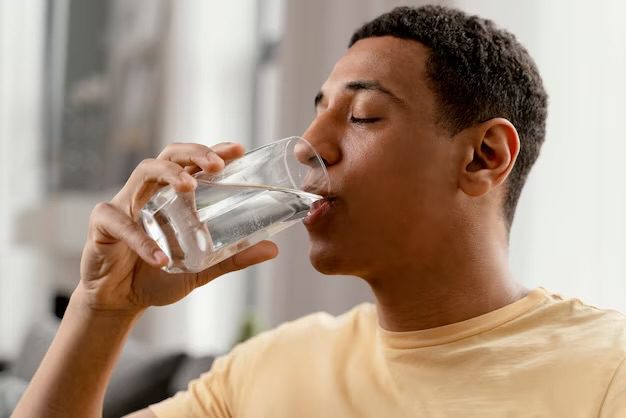

Helps With Weight Loss
Water makes you full and it results in bloating which decreases your appetite and makes you feel full throughout the day. This is what makes it essential when you’re trying to lose weight. More of it can help reduce your snacking, which reduces the amount of calories you take in a day. You can quicken your weight loss just by drinking more water
Mental Performance
According to a 2016 study, water can play a role in cognitive and mental performance, and even a little dehydration can have adverse effects on cognition.
Another 2019 study on male college students, found that dehydration had negative effects on their short-term memory and attention. The moment they were hydrated, their memory and attention improved. Always try to hydrate yourself at all times of the day to improve your mental strength.
Better Physical Performance
Maintaining the water levels inside your body is a very good way to maximize physical performance. Your body becomes dehydrated when it loses around 2 % of its water. Loss of water can make you lose weight, impair temperature, increase fatigue, and reduce motivation.
Drinking just enough of it can improve your mood and make you feel better and refreshed. Moreover, staying hydrated can help reduce oxidative stress inside the body. To get the most out of your body, you’ll need to keep it hydrated.
Good For The Skin
Many people believe that an increase in fluid intake can glow the skin. Our skin contains about 30% water. A review in 2018 found that increased water intake may have a positive effect on the outer layer of the skin, as it appeared more hydrated. However, the researchers can’t really defend if this would benefit older adults.
Increasing liquid intake can indeed help hydrate skin, but it may not show any noticeable difference in appearance. Regardless of that, our health should take priority, whether skin or hair. Overall, health care should be practiced by everyone.
Can Help Relieve Constipation
Did you know that water is the driver of your entire digestive system? Yup, it calls the shot over there. What it does, is create an environment that allows food to travel throughout your digestive tract and be digested. Taking less of it can result in constipation, but adding more of it to your daily diet can help you find relief from constipation. Mineral water is especially helpful in this situation as it provides you with magnesium which aids bowel movements.
Helps Avoid Headaches
Dehydration is one of the major causes of headaches and migraines. However, drinking more water can help relieve headaches and also avoid more of them. According to one study, drinking an extra 1.5 liters of it can help relieve migraines. While the studies may not be concrete, it’s still a good move to drink more water when you feel regular headaches.
Prevent Kidney Damage
The kidneys regulate fluid in the body, and insufficient water can lead to kidney stones. Kidney stones are formed by the deposits of minerals inside the urinary system, that can clamp together in the kidneys and urinary tracts linked to it. Some experts believe that drinking more water can help lower your risk of developing kidney stones.
Check this out URINARY TRACT INFECTION: All you need to know
An increased intake of fluids will dilute the substances moving in your urinary tract and will help make sure they exit your body, rather than sediment into the kidney. Moreover, it can also help prevent kidney stones move out of your body.
Forms Saliva And Mucus
We need saliva to digest our food and keep the mouth, nose, and eyes moist. This prevents friction and damage. And water helps us do just that. It also helps to keep the mouth clean. Substituting it for sweetened beverages can also help reduce tooth decay.
Regulate Body Temperature
Water is stored in the middle of layers of the skin and comes to the skin’s surface as sweat when the body heats up. As it evaporates, it cools the body. When there is too little of it in the body, it increases heat storage which can make a person less able to tolerate heat strains. More water in the body may reduce physical strains if heat stress occurs during physical activity, like exercise. However, more research is needed to back it up.
Some other good reasons to drink water
- It helps maintain blood pressure
- It flushes body waste
- It lubricates the joint
- Help prevent hangovers
Don’t Make These Mistakes When Drinking Water
Drinking Too Much Too Quickly
While it’s great to drink water to stay hydrated, gulping down large quantities of water at once or within a short period can strain your kidneys and lead to electrolyte imbalances.
Not Consuming Enough
Most people don’t drink enough water throughout the day. This can lead to dehydration, which causes headaches, fatigue, and other health issues. It’s important to consume water consistently even in moments you don’t feel thirsty.
Taking From Plastic Bottles All The Time
You don’t have to suddenly stop drinking bottled water, but it shouldn’t be your everyday go-to. Why? Because plastic bottles can contain chemicals that leach into the water, and it’s also bad for the ecosystem. Instead, try to consume it from a reusable bottle made from glass or metal.
Using Artificial Flavors
If you’ve been using artificial flavors to make your water taste better, stop doing that. This is a common mistake that many people make. These flavors often contain added sugars or artificial sweeteners, which can contribute to weight gain and type 2 diabetes. Instead, try adding natural flavors Ike lemon or cucumber to your water.
Not Adding Electrolytes
A lot of people consume water without electrolytes, such as sodium and potassium. Electrolytes help the body absorb and use fluids effectively, and they’re especially important for athletes or people who exercise vigorously. Consider adding electrolyte supplements or drinking water with added electrolytes.
Ignoring The Quality
Ensure that the water you drink is clean and free from contaminants. By filtering your tap water, as it can contain contaminants like lead and chlorine, which can be harmful to your health, Consider investing in a water filter (if you don’t have one) to remove these impurities and make it safer to drink.
Ignoring Thirst Signals
When you feel thirsty, don’t ignore it, but immediately hydrate yourself. Thirst is your body’s way of telling you that it needs hydration. Ignoring these signals can lead to dehydration.
Drinking Water at Extreme Temperatures
Stop consuming water when it’s extremely cold or hot water, as it can shock your system and affect digestion.
Consuming It When It Has An Unfamiliar Taste
Water is tasteless because it lacks strong flavor compounds like those found in many other beverages, so if you begin to taste some things in your water, it’s probably because it has been contaminated. It shouldn’t have any weird taste, so if you notice anything, stop immediately.
Poor Storage
Many people don’t store their water properly. Try to avoid keeping them between deodorants, dusty floors, dirty cabinets, direct sunlight, or stuffy rooms. They can contaminate and make them not drinkable.
Signs You’ve Drank Too Much Water
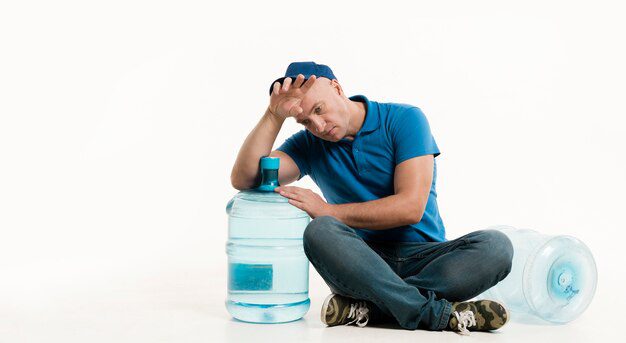

1 . Nausea and Vomiting
Excessive water intake can upset the balance of electrolytes in your body, leading to nausea and vomiting.
2 . Headaches
Drinking too much water can dilute the concentration of electrolytes in your blood, and in return, you may start to get headaches.
3 . Fatigue
An imbalance in electrolytes can occur due to too much drinking water, and it can cause fatigue and weakness.
4 . Swelling
Water retention and swelling, especially in your hands, feet, or abdomen, can occur as a result of fluid overload in the body.
5 . Too many bathroom breaks
There will be changes in urination because too much liquid can lead to frequent urination, clear urine, or even an inability to urinate. If you find yourself wanting it pee every five minutes, you’ve probably drank too many liquids.
6 . Confusion
Water intoxication can disrupt your brain’s function, leading to confusion, disorientation, and in severe cases, seizures.
Signs You’re Not Drinking Enough Water
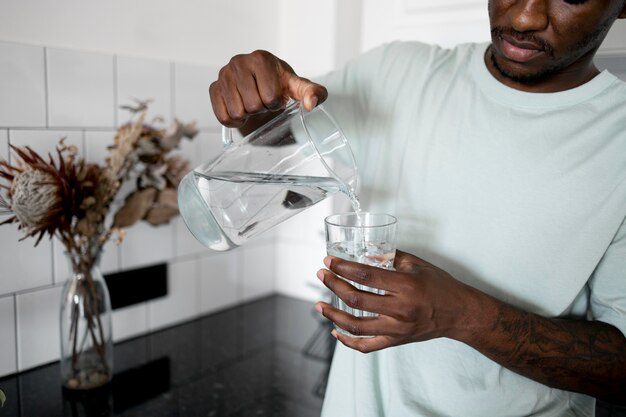

1 . Thirst
Feeling thirsty is the most obvious sign that your body needs more water. It’s essential to listen to your body’s signals and drink water when you feel thirsty. Don’t postpone it because you don’t want to pause that movie, or game or text your friend “brb” during that fun conversation. Your health should always take priority, regardless of the circumstances.
2 . Dry Mouth and Chapped Lips
Dry mouth and lips can indicate dehydration and a need for more water. And while you begin to consume it, you can use lip balms to keep your lips moisturized.
3 . Unusual Urine Color
Dark yellow or amber-colored urine is a sign of dehydration. Ideally, your urine should be pale hello or straw-colored. Anything from that could be a sign that something is wrong, and in this case dehydration. So keep them liquids.
4 Dizziness or Lightheadedness
Dehydration can lead to dizziness or lightheadedness, especially when standing up quickly. Drinking water can help restore fluid balance and remove these symptoms.
5 . Dry Skin
Inadequate hydration can lead to dry, flaky skin. Drinking more liquids helps hydrate the skin from the inside out. However, body lotions or oils also play a role in keeping your skin moisturized.
6 . Reduced Urination
If you’re urinating less frequently than usual or producing smaller amounts of urine, it may indicate dehydration. Too many bathroom breaks aren’t good, but too little is equally bad.
7 . Muscle Cramps
Dehydration can cause electrolyte imbalances that can lead to muscle cramps or spasms. Try to drink water so that it will help replenish lost fluids and electrolytes.
8 . Increased Heart Rate
Dehydration can lead to an increased heart rate because your body will be trying to compensate for a decrease in blood volume. Consuming enough water helps maintain proper blood volume and heart function.
Check out the Best heart rate monitors in 2024
9 . Fatigue
Sometimes extreme tiredness can lead to dehydration, which then results in feelings of tiredness and low energy levels. If you’re feeling fatigued, drinking water may help boost your energy.
How Much Water Should You Drink?
Studies have produced varying recommendations over the years. However, your individual water needs depend on several factors such as your health, how active you are and where you live, what you do for work, and your genetics. These are the main factors that determine how much water you should be drinking.
For example, a person who lives in a hot, humid city, and has a physically taxing job, will need to be drinking much more water than someone with an office job in a cooler climate.
There isn’t a one-size-fits-all-all policy. That’s why knowing more about body fluids will help you estimate just how much you need to drink each day.
What’s The General Recommendation For Everyone?
The Institute Of Medicine (IOM) recommends a total of 13 cups for men. And for Women, they suggest 9 cups. Pregnant ladies should drink about 10 cups of water daily. And those who breastfeed need about 12 cups.
Is Water The Only Option For Staying Hydrated?
You actually don’t need to rely on only water to meet your fluid needs. What you eat can also provide a significant portion. For example, many fruits and vegetables have high water content, such as watermelon, cucumber, oranges, and strawberries, which all are almost 100% water.
In addition, beverages like milk, juice, and herbal teas consist mostly of water. Even caffeinated drinks- such as coffee and soda, can contribute to your daily water intake. However, you should go easy on the sugar or sweetened drinks. Regular soda, energy or sports drinks, and other sweet drinks usually contain a lot of added sugar, which may lead to you taking more calories than needed.
How Do I Know I’m Drinking Enough Water?
Your fluid intake is probably adequate if you rarely feel thirsty and your urine is colorless or light yellow.
How Long Should I Drink Water Before And After Eating?
It’s okay to let at least half an hour go by to drink some water, before and after eating. But remember to drink when you’re thirsty, regardless of whether it’s before or after a meal.
Can I Drink Water While Working Out?
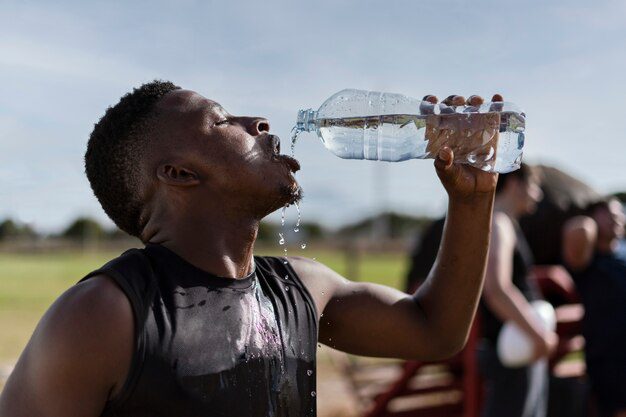

Drinking liquids like water or energy drinks during a workout session isn’t harmful. However, some people complain about getting stomach aches or discomfort afterward and cannot finish their workout. So it depends on the individual and how their body works.
Overall, it’s best you hydrate yourself before working out, don’t begin to exercise knowing that you’re thirsty. And when you do drink before working out, try to wait for at least 30 minutes before you begin to exercise.
Is It Good Or Bad To Drink Before Brushing Your Teeth In The Morning?
It’s not necessarily harmful to your health, but drinking water with a dirty mouth may not be the best choice. In some instances of extreme thirst the moment you wake up, it’s okay to do so. However, it shouldn’t become a routine, it’s you brush your teeth before undoing things like eating and drinking.
Standing vs Sitting When Drinking Water
The best position to be in when ingesting anything is sitting. Don’t make it a habit to drink water when standing, except in some cases where you’re busy or outdoors. But it’s much better to sit when you’re ingesting food or drinks.

